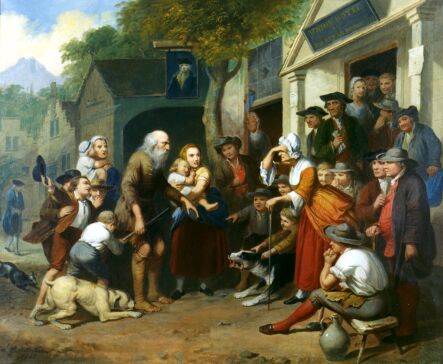Patrick Logan, freelance writer and regular reader of this blog, sent me a marvelous essay about cultural dislocation that he wrote for the Manchester Union Leader. (I’ve made reference to previous articles that Patrick has written here). Patrick uses the famous Washington Irving story abut Rip Van Winkle to process his own shock when, returning to the United States after 20 years in Asia, he learned that America under George Bush was not the America he had known under George Bush.
By Patrick Logan
Waking from his long sleep, a perplexed Rip Van Winkle makes his way to a changed village and enters a building where the old inn once stood. Asked “on which side he voted,” Rip shocks the gathering by claiming to be a loyal subject of King George. Unaware of the Revolution or anyone named George Washington, Rip is accused of being a spy.
Returning to New Hampshire after twenty years in Asia, I experienced my own Rip Van Winkle moment over a couple of different Georges. Chided at a local coffee shop for carrying the New York Times, I defended myself by saying that I had supported the first George Bush, but had nothing good to say about the second. The ensuing silence was broken by the sound of a coffee mug being placed on a table followed by an accusation that I was a liberal.
I’d left for Japan in the late 1980s and discovered a land where most folks were reserved, laconic and a bit indifferent to strangers, an easy adjustment for me since these qualities matched the stereotypical New Hampshire Yankee as well.
Like Rip, I discovered upon my return that many things had changed during my two decades away. At a nearby gym, a young woman strode by wearing a t-shirt on which was written: “Don’t Give A F**K” (four letters, no asterisks). Meaning, I suppose, that she didn’t care what others thought about her or her opinions. Why anyone would actually “give one” to know whether or not she “gave one” seemed a bit presumptuous. I considered pointing this out to her. Instead, I sat silently at the bench press, concluding that I was experiencing another Van Winkle Moment. Folks seemed to have developed a great desire to communicate their opinions, no matter how ill informed or unbidden.
We Yankees weren’t always this way. Once, finding herself sitting next to Calvin Coolidge, Dorothy Parker mentioned that she’d made a bet with someone who doubted she could get more than two words out of the Vermont-born President. “You lose,” he replied.
I miss such reticence.
Perhaps I inherited my reserve from my father. In his high school yearbook, he listed his favorite quote as, “I have often regretted my speech, never my silence.” Later, as a conservative Republican, he no doubt obeyed this dictum as the husband of a liberal Democrat. Otherwise, the years 1968, 1972 and 1976 would have been even more contentious in our house. Comments on political matters were always made judiciously. Wisely, I became a centrist.
Returning from years overseas, I discovered that there were fewer of us in the middle. Some have attributed this drift to the partisan redrawing of congressional districts, which carve out majorities of one party or the other and lead to oddly shaped entities such as the “rabbit on a skateboard” in Illinois. By doing so, candidates no longer need to appeal to a broad constituency. Others blame cable news programs and Internet sites that reflect and then narrow the point of view of the viewer.
It took time for Rip to accept his new reality. I’m gradually adjusting to mine. In an earlier time, bumper stickers around here boasted, “This car climbed Mt. Washington.” Now, they are more likely to read, “Somewhere in Kenya a village is missing its idiot.” I don’t like this change and I’d bet lots of Americans feel the same. Of course, many might respond to such a wager with, “You lose.”
(The essay appeared in the Manchester Union Leader on February 20, 2012, page A11.)


